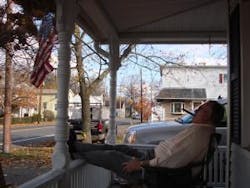Did I ever tell you the story about the Captain I knew in the City of Newark who would never help his crew load the hose back onto their pumper? It did not matter if the crew was full or riding short. This bum would sit in the cab of the pumper smoking a cigarette while his people worked to reload the hose. What a terrible example of first-line supervisions and leadership. But do not think that I am limiting my comments solely to the realm of the first line supervisor.
I have another story for you. I want you to know that if you are unlucky enough, the same thing can ring sadly true for certain selfish chiefs on the fireground. There is one particular Battalion Chief I can recall who took great pride in the trumpeting the fact that he never wore self-contained breathing apparatus (SCBA). What a bum.
He mentioned this to me just after I came stumbling out of a burning church, covered with soot and soaking wet, after working with a very aggressive group of engine companies to halt the spread of the fire from the church to an adjoining apartment house. He was great for shouting encouragement from the safety of the street. He was also famous for calling the shots on a cold winter’s night from the heated front seat of his chief’s car.
He mentioned this to me just after I came stumbling out of a burning church, covered with soot and soaking wet, after working with a very aggressive group of engine companies to halt the spread of the fire from the church to an adjoining apartment house. He was great for shouting encouragement from the safety of the street. He was also famous for calling the shots on a cold winter’s night from the heated front seat of his chief’s car.
He would roll his window down about an inch and yell his order to those of us out in the cold night air. The only time this guy ever led from the front was when it came time to catch an ambulance for the hospital: Or to hit the chow line. There came a time when I figured that if I did my job exactly opposite from him, I would succeed. It is my belief that I was right on that accord.
Another burr that periodically pops up under my saddle involves officers who spend their entire lives doing paper work. They will call a drill or a cleanup detail, show their face and then duck into the office under the guise of doing paper work. While the troops are slaving away on a drafty apparatus floor getting wet and dirty, these home-office commandos hide behind the doors of their computer-laden palaces.
Another burr that periodically pops up under my saddle involves officers who spend their entire lives doing paper work. They will call a drill or a cleanup detail, show their face and then duck into the office under the guise of doing paper work. While the troops are slaving away on a drafty apparatus floor getting wet and dirty, these home-office commandos hide behind the doors of their computer-laden palaces.
How can you supervise people that you cannot see? How do you even know if the work is being accomplished if you are hidden away in a warm and comfortable office? Even if you don’t want to lower yourself to swab toilets with the peasants, why not hang around and offer a bit of support and encouragement to the working class.
There is a time and a place for paperwork. I realize that it is a necessary evil which comes with the burden of command. Let's face facts. The good leader never ducks out on the dirty details. They do not leave the troops on their own. They are also going to be sure to share the good and the bad with their troops.
Conversely, I can remember a certain Deputy Chief who allowed each of his Battalion Chiefs to take charge of their battalion districts. He encouraged his chiefs to make decisions and try innovative approaches. He allowed them to try. When they failed, he helped them learn from their mistakes.
He took a great deal of grief from the troops in headquarters, but he stood behind his guys. And when the chiefs succeeded, as they did with growing frequency under his tutelage, he allowed them to bask in the warm glow of their success. He did not rush in and take credit for their good works. However, the troops all knew that he was at the root of their success. People went out of their way to transfer to his shift, because they knew that the work environment was stimulating and secure.
Those things which people see a leader model stimulate them to act. They can either emulate them or reject them. People who act in such a way that they are labeled as poor leaders (some call them frauds) are usually rejected by people who see them for the misdeeds that they done. However, if they are a negative example, and are emulated by their followers, they will then spread the seed of bad leadership. That is why it is so critical for any of us in positions of leadership to set a positive example.
More than that, the ways in which we train our followers set the tone for the future leadership pool in our organization. A great leader can bring about several generations of effective leaders. However, one bad apple can beget a series of future bad apples that can hamstring their department’s ability to be successful into the future. Many fire departments are experiencing leadership problems owing to a series of poor leaders who followed one upon the other.
There is also the matter of the inside versus the outside search for fresh departmental leadership. Many communities go through the window dressing of a wide area search to disguise the fact that they intend to crown a local prince as the new king. A number of professional associates have gone through the sweat and strain of traveling for interviews only to see the insider get the job anyway. If a fresh style of leadership is deemed necessary, it should be done in a fair and impartial manner through the use of a third party recruiting firm.
I fear that many communities are almost at the point of no return when it comes to changing how they operate. The insidious growth of political influence has so thoroughly permeated many municipalities that the fire departments in those places have been reduced to job services for the favored few. I see instances of this every week on the Internet.
How did the fire service come to this point in history? This came about through the magic of misguided leaders who never did have a good example to follow during their growth and maturation as first-line and mid-level managers. Can people change? There is always hope. That is why I keep pounding the keys on my weary computer.
Maybe someone, somewhere will rise up, shake off the dust of past bad leadership and take an enlightened approach to the 21st Century. They will then become a true servant to the troops and a leader within their community. If and when they do, I hope that they might possibly remember that back in his day a tired old Battalion Chief from the City of Newark stood up on more than one occasion and yelled, “… follow me” That is what I hope.

About the Author
Dr. Harry Carter
HARRY R. CARTER, Ph.D., who is a Firehouse contributing editor, is a fire protection consultant based in Adelphia, NJ. He is chairman of the Board of Commissioners in Howell Township Fire District 2 and retired from the Newark, NJ, Fire Department as a battalion commander. Carter has been a member of the Adelphia Fire Company since 1971, serving as chief in 1991. He is a life member and past president of the International Society of Fire Service Instructors and life member of the NFPA. He is the immediate past president of the U.S. branch of the Institution of Fire Engineers (IFE) of Great Britain. Carter holds a Ph.D. in organization and management from Capella University in Minneapolis, MN.
Connect with Harry:
Email: [email protected]
Voice Your Opinion!
Voice Your Opinion!






